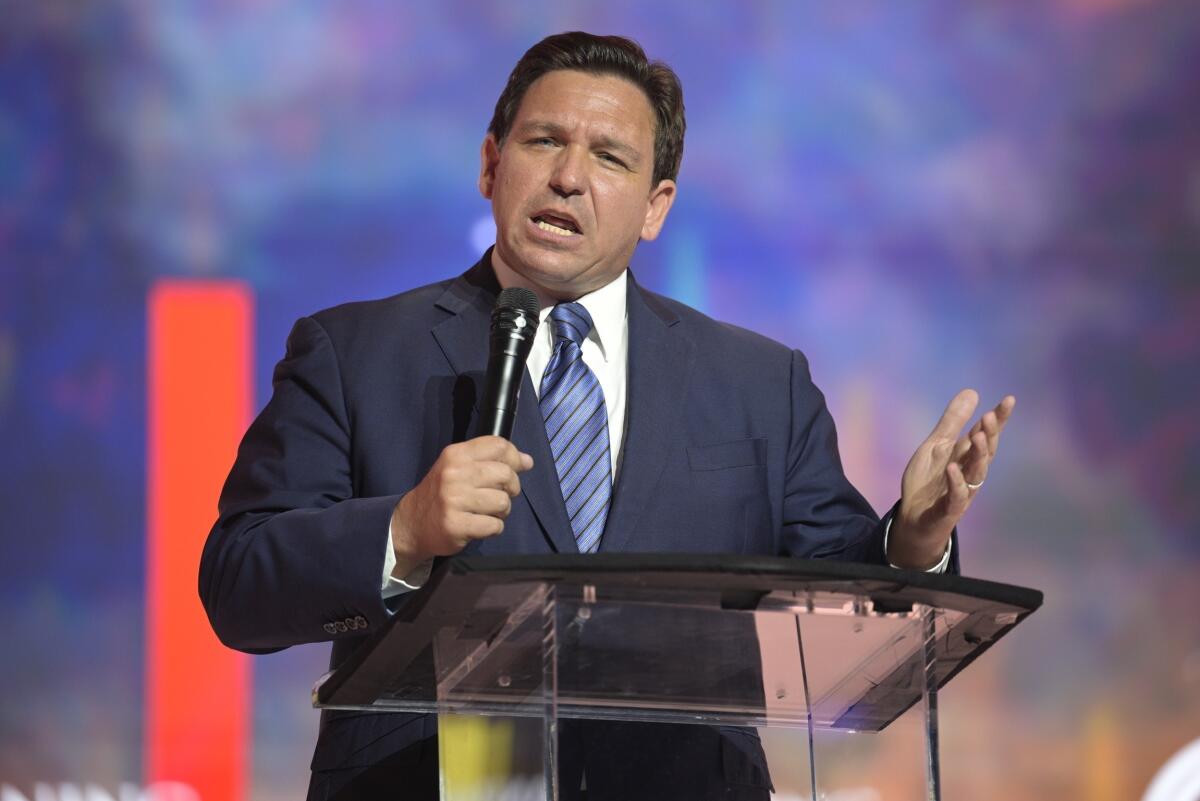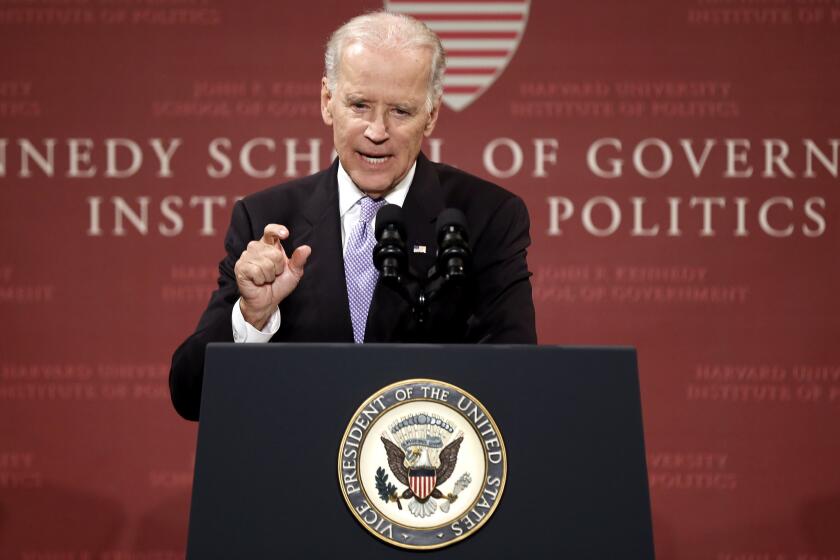Cha-ching! After a pandemic pause, California is again in the thick of campaign money chase

- Share via
Florida Gov. Ron DeSantis has accused Gov. Gavin Newsom of treating California residents like “peasants.” He has claimed California’s policies on crime, homelessness and the pandemic have prompted residents to flee. He’s crowed about California’s population loss.
He may not like much about California, but DeSantis is more than happy to visit the state to scoop up cash for his reelection bid.
The potential 2024 Republican presidential candidate is headlining a fundraiser next month at the $50-million Newport Coast compound owned by “Undercover Billionaire” star Glenn Stearns and his wife, Mindy, a former Los Angeles TV entertainment reporter.
The cost: up to $25,000 per couple. The top donation comes with four tickets to a cocktail hour and a VIP reception, a chance to snap a picture with DeSantis — the overwhelming favorite of California Republicans if former President Trump doesn’t run in 2024 — and preferred dinner seating at the Stearns’ nearly 30,000-square-foot mansion overlooking the Pacific Ocean.
Such extravagant fundraisers, often at the homes of Hollywood royalty or Silicon Valley tech honchos, largely paused during the early months of the pandemic. But politicians from the two parties — both in-state and outsiders — are holding them again in the lead-up to this fall’s midterm elections, which will determine control of Congress.
“With the Senate and House in play and so many other critical races this November up and down the ballot, we need to do all we can to support President Biden right now,” said investor Andrew Hauptman when he and his wife, Ellen Bronfman, an heiress to the Seagram liquor empire, hosted Biden for a fundraiser at their Brentwood estate this summer.
The gathering raised nearly $2.5 million from about 30 people for Democratic efforts nationwide. One month later, at the same estate, several governors attended a fundraiser that brought in more than $1 million for the Democratic Governors Assn.
The Golden State has had an overwhelmingly sapphire voting record in recent years, but both parties benefit from the nation’s ATM for politicians. California has long been the No. 1 source of campaign cash. Legendary California lawmaker Jesse M. Unruh — known as “Big Daddy Unruh” — said more than half a century ago that “money is the mother’s milk of politics.”
No state has as much milk as California.
As next month’s midterm elections near, politicians from both sides of the aisle are swarming California to boost their parties’ fortunes in contests that could decide the balance of power in Washington -- and to forge relationships in advance of the 2016 presidential race.
“The bank robber says you rob banks because that’s where the money is. If you’re raising money, you go to Florida, you go to Texas, you go to New York and you go to California,” said former state GOP Chairman Jim Brulte. “It doesn’t mean there aren’t wealthy people in Minnesota, but California is just a target-rich environment.”
He added the state’s Republican contributors also appreciate being able to spend their money in races in states where they can make a difference. (Californians last elected Republicans statewide in 2006.)
Californians have donated more than $489 million in the current 2021-22 midterm election cycle to federal candidates, political action committees, parties and outside spending groups from across the nation through late July, according to the nonprofit Center for Responsive Politics. Two-thirds of the donations to candidates and parties went to Democrats while Republicans received 30%.
The dollar figures are even higher during presidential elections. Californians donated nearly $1.7 billion during the 2019-20 cycle. Democrats received 69%, Republicans 29%.
(These figures, which are based on Federal Election Commission data, do not include contributions to candidates running for state office such as DeSantis or mayoral or other local contests.)
This is the peak season for candidates to travel out of state to raise money as many voters are disengaged from politics, enjoying the last weeks of summer and preparing for their children to return to school. Aggressive on-the-ground campaigning isn’t expected to begin until after Labor Day.
Iowa Sen. Joni Ernst will be in California this week, including a stop at a reception Wednesday in Orange County to boost Rep. Young Kim and her Congressional Club. Membership in the club ranges between $5,800 and $20,000 per person; supporters will receive access to at least four events per year.
Republicans Sen. Rick Scott of Florida and Pennsylvania Senate hopeful/television star Mehmet Oz will be in Santa Ana in October to raise money for the National Republican Senatorial Committee, which Scott chairs. Tickets top out at $50,000.
On the Democratic side, Gov. Gretchen Whitmer of Michigan, Senate Majority Leader Charles E. Schumer, Sens. Raphael Warnock of Georgia, Maggie Hassan of New Hampshire, Mark Kelly of Arizona, Catherine Cortez Masto of Nevada and Rep. Tim Ryan of Ohio are expected in California in coming weeks. Senate candidates including Mandela Barnes of Wisconsin and Cheri Beasley of North Carolina are also planning visits.
“Everyone’s coming all the time,” said Gretchen Sisson, a Bay Area Democratic fundraiser who is hosting several of the gatherings. “It’s probably easier to ask which Senate and gubernatorial candidates aren’t coming.”
In Southern California, Democrats have been Hollywood favorites for many years, but former President Obama may represent the apex. He drew enormous sums for his campaigns and his party from celebrities, artists and studio moguls at events scattered throughout Southern California’s most exclusive enclaves. He raised about $140 million from Californians for his campaign committee and far larger sums for other Democratic groups in the 2008 and 2012 elections.
Julia Roberts, Robert Downey Jr., Diane von Furstenberg, Barbra Streisand, Tobey Maguire, Billy Crystal, Jack Black and Salma Hayek were among the attendees.
“We’re so excited and you’re so handsome that I can’t speak properly,” Gwyneth Paltrow said as she introduced Obama in 2014 in her Brentwood backyard.
Celebrity chef Wolfgang Puck catered a dinner for Obama two years prior on George Clooney’s basketball court in Studio City at an event co-hosted by DreamWorks Animation chief Jeffrey Katzenberg that raised nearly $15 million, believed at the time to be the largest one-night campaign haul ever.
The pandemic dramatically changed fundraising in 2020. In-person events were largely canceled, particularly for Democratic candidates. Virtual fundraisers became the norm — a shift that came with benefits and disadvantages.
It cost less to take part, which, coupled with Donald Trump at the top of the ticket, prompted contributions from many new liberal donors. Additionally, travel, catering and parking were eliminated, allowing online fundraisers to reach far more donors at little expense.
“It’s a tremendously liberating way to raise much-needed campaign dollars,” Andy Spahn, a Democratic fundraiser who advises entertainment industry executives, said at the time. (Spahn helped organize three events in summer 2020 that raised $20 million for the Biden campaign.)
However, some of the new donors do not feel a similar urgency this year, said another Democratic fundraiser who asked for anonymity to speak candidly.
“They were new to this, excited about the candidates they were giving to, excited to attend virtual events,” the fundraiser said. “And then [some] of their candidates lost. So they have a sense of frustration that makes it harder for the midterms.”
More to Read
Get the L.A. Times Politics newsletter
Deeply reported insights into legislation, politics and policy from Sacramento, Washington and beyond. In your inbox three times per week.
You may occasionally receive promotional content from the Los Angeles Times.












